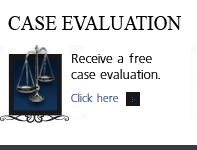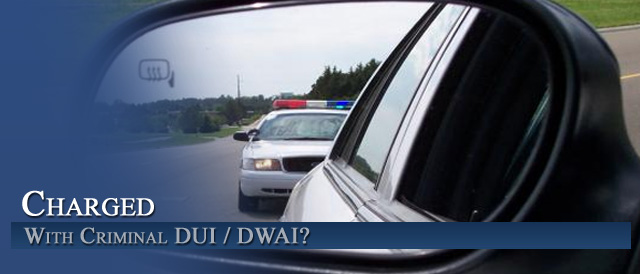
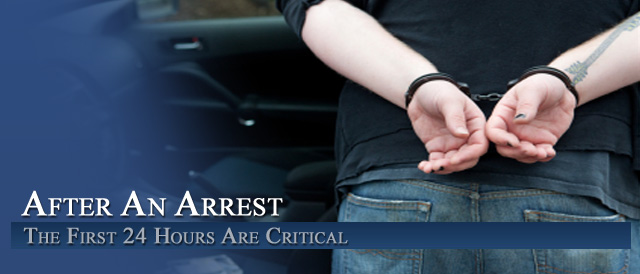

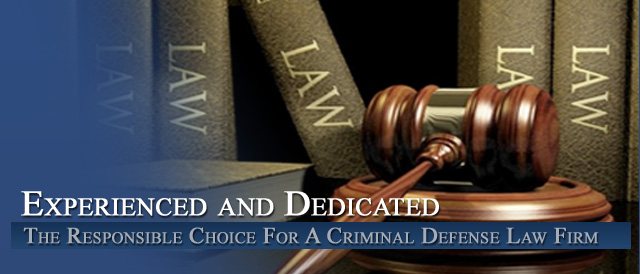
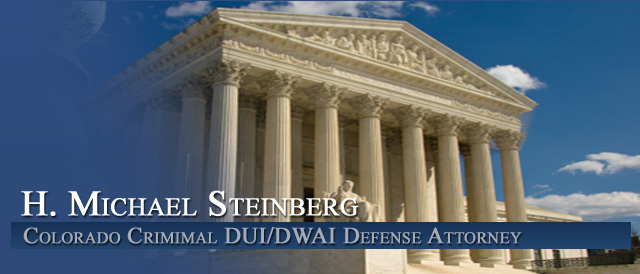
Colorado DUI Law – DUI Probation Violations – Revocation Of Probation
By H. Michael Steinberg Colorado DUI Criminal Defense Lawyer – Attorney
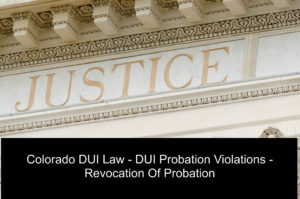 Colorado DUI Law – DUI Probation Violations – Revocation Of Probation – Colorado probation laws can be complex and frightening. Even when you believe you have complied with the terms and conditions of your probation – you may be facing a revocation of probation hearing. This article looks at the laws and practicalities of a Colorado DUI revocation of probation procedure to help you understand what happens in these proceedings.
Colorado DUI Law – DUI Probation Violations – Revocation Of Probation – Colorado probation laws can be complex and frightening. Even when you believe you have complied with the terms and conditions of your probation – you may be facing a revocation of probation hearing. This article looks at the laws and practicalities of a Colorado DUI revocation of probation procedure to help you understand what happens in these proceedings.
Understanding Colorado DUI Revocation Of Probation Matters
All probation violations begin the same way.
A probation revocation complaint must be filed which alleges that you have violated one or more of the conditions set for your probation.
The law requires something called “notice and a hearing.” Ultimately you will be required to either admit one or more of the allegations in the complaint or deny them and demand a hearing.
There is no jury trial. A probation revocation hearing is conducted by a Judge and the burden is on the prosecution to prove the allegations contained in the complaint to revoke.
If you win the hearing – that is, the complaint is not proven, you are “returned to probation” under the pre-existing terms and conditions of your probation sentence. But if you lose the hearing, the Judge has the right to re-sentence you to any sentence that the court could have originally imposed.
Two Key Statutes Govern How A Colorado DUI Probation Proceeding Must Be Performed C.R.S. § 16-11-205 and C.R.S. § 16-11-206
C.R.S. § 16-11-205
This law governs the procedures for the initiation of the probation violation complaint and also for the procedures for summoning or arresting the probationer for advisement and hearing.
C.R.S. § 16-11-206
This law governs the actual procedure and procedural protections for conducting the revocation hearing.
Certain appellate decisions, (decisions by higher courts), guarantee certain constitutional protections that must be accorded to you in Colorado probation revocation proceedings. These cases interpret and help define the statutes above.
But note this, the procedural protections in probation violation cases are much less “protective” than those given to a person first accused of a crime before conviction and before that person has been sentenced to probation.
A Closer Look At How Colorado DUI Probation Violation Proceedings Are Initiated
In almost every case a Colorado probation revocation proceeding is initiated by the filing of a complaint by a probation officer or district attorney. This procedure is required by C.R.S. § 16-11-205(5).
A Probation Violation Complaint must have this information:
- The name of the probationer.
- A statement of the alleged violation or violations.
- The date and approximate location of the alleged or violations.
- A signature of the probation officer or the district attorney.
The Summons In The Mail
What usually happens is the Court sends a summons, along with a copy of the complaint to the last known address of the defendant.
The “service” of the summons and the attached complaint (and notice of hearing) can be served on the defendant’s attorney, but usually it is just mailed to the Defendant at the last provided address since most lawyers withdraw from representation after the sentencing hearing in the case. (Crim. P. 44(e) provides that counsel’s representation automatically terminates following the conclusion of trial court proceedings).
If Arrested
Alternatively, if a Judge is requested to arrest the probationer and finds that an arrest is “reasonably necessary,” the Court may issue a warrant in lieu of a summons. (See C.R.S. § 16-11-205(6)).
Colorado probation officers have the right to arrest a “probationer” even before a probation revocation complaint is filed (C.R.S. § 16-11-205(1)). That arrest can happen EITHER with an arrest warrant OR with probable cause to believe that a crime or a probation violation has been or is being committed by the probationer.
If a complaint has not yet been filed and an arrest has been made – the probation revocation complaint must be filed within seven working days of the arrest. (C.R.S. § 16-11-205(4)).
What If Probation Expires Before The Filing Of The Probation Violation Complaint
If an arrest has not been made or a complaint timely filed within before the expiration of the term of probation, a Judge loses jurisdiction (the authority) to proceed on the probation violation allegation. (But see revocation of deferred judgment agreements below).
Summary Of The Initiation Of A Colorado DUI Probation Matter
A probation revocation is “initiated” in one of four ways:
(1) the issuance of a summons by a probation officer;
(2) the arrest of a probationer by a probation officer;
(3) the filing of a complaint for the revocation of the probation; or
(4) the filing of a report by the probation officer, or a verified complaint by any person, together with a request for an arrest warrant.
What If I Fail To Appear For My DUI Probation Violation Court Date?
If a “probationer” fails to appear after receiving the summons from the court, a failure to appear warrant is issued for the arrest of the Defendant. Sometimes the failure to appear is because the Defendant failed to update the probation department of a change in address. If that happens, that is another “independent” violation of probation. (C.R.S. § 16-11-205(2)).
The First Appearance In Court In A DUI Probation Violation Matter
At a Defendant’s first appearance in court on a probation violation complaint (whether in custody or pursuant to summons), the Judge will advise the probationer of the following rights:
(1) the right to remain silent and the fact that any statement can be used against the probationer;
(2) the right to counsel and to the appointment of counsel if the probationer cannot afford to hire counsel;
(3) that any admission to the complaint must be voluntary and not the result of undue influence or coercion;
(4) that the probationer has the right to bail; and
(5) the nature of the allegations in the complaint.
The Judge must locate and serve the Defendant a copy of the probation violation complaint. (C.R.S. § 16-11-206(1)).
Your Options At The Time Of The DUI Probation Violation Advisement
At the time of the probationer’s advisement the Judge will ask whether the probationer admits or denies the allegations in the complaint. If he or she admits the complaint to revoke probation, the Judge may proceed to sentencing or set the matter over for an updated pre-sentence investigation for the purpose of re-sentencing the case.
On the other had, if the probationer chooses to deny the allegations in the complaint, the Judge will set a probation revocation hearing and if the probationer is in custody, that probation revocation hearing must be held within 14 days, (or within 14 days of the filing of a complaint against a probationer who has been arrested by the probation officer – C.R.S. § 16-11-206(4))
If the probationer is not in custody, the hearing should be set within a reasonable time
What Happens At The Hearing On A Colorado DUI Probation Violation?
Once the probation revocation proceeding actually begins, the law requires the Judge to again advise the probationer of the allegations in the probation revocation complaint and of the possible penalties in the event one or more probation violations are found.
The Burden Of Proving The Probation Violation Allegations
The burden of proof at the revocation hearing is on the prosecution but not beyond a reasonable doubt (unless a new crime is the basis for the alledged violation). The burden of proof is the same as Colorado’s civil burden of proof – the allegations of a violation of DUI probation need only be proven “by a preponderance of the evidence” or just above 50% proof..
BUT, if the State is alleging a new criminal offense as the basis for revoking DUI probation, then the burden of proof is the much higher standard of “beyond a reasonable doubt.” Note this also – if the probationer has already been convicted of a new offense, the burden of proof drops back to the civil standard of proving that conviction happened.
Finally, if the new charge is still pending in another case or in another jurisdiction, the Judge will almost always continue the hearing – or “trail” it until the resolution of the new charges.
The Strict Application Of The Colorado Rules of Evidence Not Applied To Colorado Probation Revocation Proceedings. CRE 1101(d)(3).
The law governing a Colorado DUI probation violation hearing (C.R.S. § 16-11- 206(3)) provides that: “any evidence having probative value shall be received”
Other rules that suppress evidence illegally obtained – which would normally require exclusion under the “exclusionary rule” in most other criminal procedural matters, do not apply to Colorado probation violation hearings. For example, hearsay evidence, which is not allowed in a trial unless there is a specific rule which permits it, is always admitted at a Colorado probation violation hearing as long as the Defendant has “a fair opportunity to rebut” (to fight) that hearsay.
In addition to allowing hearsay to be freely admitted, there is no constitutional right to confront one’s accusers and to the extent that the Defendant has a right to confront the State’s case in a Colorado DUI probation revocation proceeding, …that right is severely limited and it arises from the due process clause, not the confrontation clause of the Constitution.
Not A Full Blown Trial – Minimum Due Process Rights Apply
A Colorado DUI probation violation hearing is not like a trial. However, the procedure for conducting a probation violation hearing provides for certain minimum due process righrs based on the Constitution.
The Constitutional protections applicable to a Colorado DUI probationer facing revocation are:
(1) A written notice of the claimed violations;
(2) The disclosure of the evidence against him or her;
(3) An opportunity to be heard in person and to present witnesses and documentary evidence;
(4) The right to confront and cross-examine adverse witnesses (unless the hearing officer specifically finds good cause for not allowing confrontation);
(5) A neutral and detached hearing body. (the Judge);
(6) The right to counsel at a revocation proceeding if the prosecution is seeking jail time.
The Mechanics Of An Actual Colorado DUI Probation Revocation Hearing
Unlike an actual trial, most criminal defense lawyers do make opening statements at a probation violation hearing. The prosecution presents their case – “the evidence” – through witness testimony (usually just the PO – the probation officer), the Court takes “judicial notice” of the Court file (what has happened in the case to date) and any agreements (called stipulations as to the evidence), are admitted if any are made with the defense.
The Defense is entitled to cross-examine any prosecution witnesses.
After the prosecution finishes putting on their case and rests, the Defendant may make an oral Motion to Dismiss the probation revocation complaint if the Defense believes allegations in the complaint have not been proven.
Usually the Motion to Dismiss is denied. When it is, the Defendant has the right to present their case which can also include witnesses or other any other evidence that bears on rebutting the State’s case. The Defendant has the right to testify if he or she chooses.
At the conclusion of all the evidence, the lawyers DO usually make closing arguments – arguing their respective positions and their individual interpretations of the sworn evidence offered at the contested hearing.
The Judge then makes findings of fact and conclusions of law as part of its ruling on which side won which issues and once again, if the Judge finds the allegations have not been proved, the Judge will reinstate probation for any remaining period under the pre-existing terms and conditions.
On the other hand, if the Judge finds that the probation revocation the allegations have been proved, the Judge will revoke probation.
While most Judge’s make the decision to revoke or not to revoke probation immediately, the law allow allows the Judge 7 days after a finding of a violation to decide whether to revoke or continue probation.
Plea Bargaining In The Context Of Colorado DUI Revocation Of Probation Cases
As a practical matter, most Colorado DUI probation violation complaints are customarily resolved through comprehensive discussions with the DA. Plea bargaining in this context can be difficult because of the lack of leverage a convicted Defendant has at this stage in the criminal justice system.
An experienced Colorado criminal defense lawyer will almost always seek the reinstatement of probation with an extension of time for the Defendant to complete the terms and conditions of probation. The better course of action is not to “enter a plea” but to try to continue the formal resolution of the complaint to provide the Defendant an opportunity to finish probation successfully.
Many Colorado Judges are very strict in the context of violation of probations and do not always agree to a continuance for the purpose of finishing out the terms and conditions of probation they originally set at sentencing in the case. These Judges often put different restrictions on the types of agreements that are acceptable to the Court under these circumstances depending on how aredious the probation violations are as alleged.
Re-sentencing After A Finding Of Revocation Of Probation In A DUI Case
The law is this in every probation violation case that has been proven is the same: unless there is an agreement to the contrary (a plea bargain) that the Judge approves in advance, if probation is revoked, a Judge may impose any sentence, or grant any new terms and conditions of probation that the court might originally have imposed or granted – and that includes a punitive or jail / prison component.
Here is the rub – and the most important part – the “re-sentencing power” of the Judge exists without regard to any sentence concessions that might have been part of the original plea agreement. What that means is the Judge is free to impose a jail sentence despite the initial plea bargain stipulations to probation at the time of any historical (prior to the revocation of probation) plea bargains in the case.
The Judge is NOT bound by the DA’s recommendations and may also decide NOT to re-sentence the Defendant to jail or prison after the Defendant has lost the probation violation hearing.
Are Probation Revocations In Deferred Judgment And Sentence Cases Different?
Most of the time the rules and laws above apply equally to deferred judgement and sentence agreements. For example if a Defendant is on a deferred judgment and sentence for an offense ,and violates the terms and conditions of probation with one exception (drug possession cases), the Judge must revoke the deferred judgment and enter a conviction in the case at sentencing.
To repeat, in almost every circumstance, a Colorado Judge does not have the authority to reinstate a deferred sentence, and again, after the conviction enters, the Judge may impose probation or any sentence that is otherwise authorized by law.
But there are at least two major differences that apply only to revocations of deferred judgements.
First, the State has the right to apply for the revocation of a deferred judgment and sentence during the period of the deferred (same as regular probation) but the difference is this – the State also has the right to filed a complaint to revoke a deferred judgement and sentence within 35 days following the last day of the deferred judgement.
As long as the petition for revocation of the deferred judgement is filed within this 35 day period, the actual revocation proceedings may occur outside of the extended period.
Second, and this bears repeating, in almost every circumstance, a Colorado Judge does NOT have the authority to reinstate a deferred sentence after the conviction enters (with one exception for Colorado Drug Crime cases) and may impose probation or any sentence that is otherwise authorized by law.
Enhanced Penalties For Repeat DUI Offenders Who Violate Probation In Colorado
In 2010, the Colorado State legislature enhanced the penalties for DUIs and DWAIs.
In the context of probation violations the section of the law that applied to probation-related penalties removed the Judge’s normal discretion to sentence within their usually broad discretion and mandated certain results be imposed. (C.R.S. § 42-4-1307(7)).
Probation Violation Mandatory Sentences For Second And Third DUI – DWAI Convictions
Under the enhanced sanctions for violations of Second and Third (or more) DUI – DWAIs, the Judge has not choice but to impose the one-year jail sentence that was suspended at the time of sentencing. Note this important point – The jail sentence already served in the case is NOT credited against that one year sentence!
BUT – and this is equally important, the Judge has the authority to impose all or part of the suspended year for the violation or violations of probation that were proven at the hearing.
(C.R.S. § 42-4-1307(7)(c)(I).)
Before imposing the jail sentence, the law also requires the Judge to consider certain critical factors in making his or her decision to sentence to all or just part of the one year suspended sentence.
Those factors are:
-
The nature of the violation;
-
The report or testimony of the probation department;
-
The impact on public safety;
-
The person’s progress in alcohol treatment; and
-
Any other information relevant to assisting the defendant to comply with probation.
If and when the Judge imposes jail time under this subsection the law requires the judge not to impose the sentence as pure punishment but rather to promote compliance with the terms of probation.
Colorado DUI Law – DUI Probation Violations – Revocation Of Probation
If you found any of the information I have provided on this web page article helpful please click my Plus+1 or the Share buttons for Twitter or Facebook below so that others may also find it.
The contents of this article are based upon my research, my personal experience and my personal analysis and opinions developed from my thirty-six years (as of 2017) of criminal trial experience from both sides of the courtroom – as a former career prosecutor for Arapahoe and Douglas Counties (13 years) and as the owner of my own Criminal Defense Law Firm since 1999 (18 years).
The reader is also admonished that Colorado criminal law, like criminal law in every state and at the Federal level, changes constantly. The article appearing above was accurate at the time it was drafted but it cannot account for changes occurring after it was uploaded.
If, after reading this article, you have questions about your case and would like to consider retaining our law firm, we invite you to contact us at the Steinberg Colorado Criminal Defense Law Firm – 303-627-7777.
Never stop fighting – never stop believing in yourself and your right to due process of law. You will not be alone in court, H. Michael will be at your side every step of the way – advocating for justice and the best possible result in your case. H. Michael Steinberg is passionate about criminal defense. His extensive knowledge and experience of Colorado Criminal Law gives him the edge you need to properly handle your case
 ABOUT THE AUTHOR: H. Michael Steinberg – Email The Author at:
ABOUT THE AUTHOR: H. Michael Steinberg – Email The Author at:
A Denver Colorado Criminal Defense Lawyer – or call his office at 303-627-7777 during business hours – or call his cell if you cannot wait and need his immediate assistance – please call 720-220-2277.
“A good criminal defense lawyer is someone who devotes themselves to their client’s case from beginning to end, always realizing that this case is the most important thing in that client’s life.”
You should be careful to make a responsible choice in selecting a Colorado Criminal Defense Lawyer. We encourage you to “vet” our firm. Over the last 36 plus years – by focusing ONLY on Colorado criminal law – H. Michael has had the necessary time to commit to the task of constantly updating himself on nearly every area of criminal law, to include Colorado criminal law and procedure and trial and courtroom practice.
Putting more than 36 years of Colorado criminal defense experience to work for you.
H. Michael works hard to get his clients the best possible results in and out of the courtroom. He has written, and continues to write, extensively on Colorado criminal law and he hopes this article helps you in some small way – Colorado DUI Law – DUI Probation Violations – Revocation Of Probation.
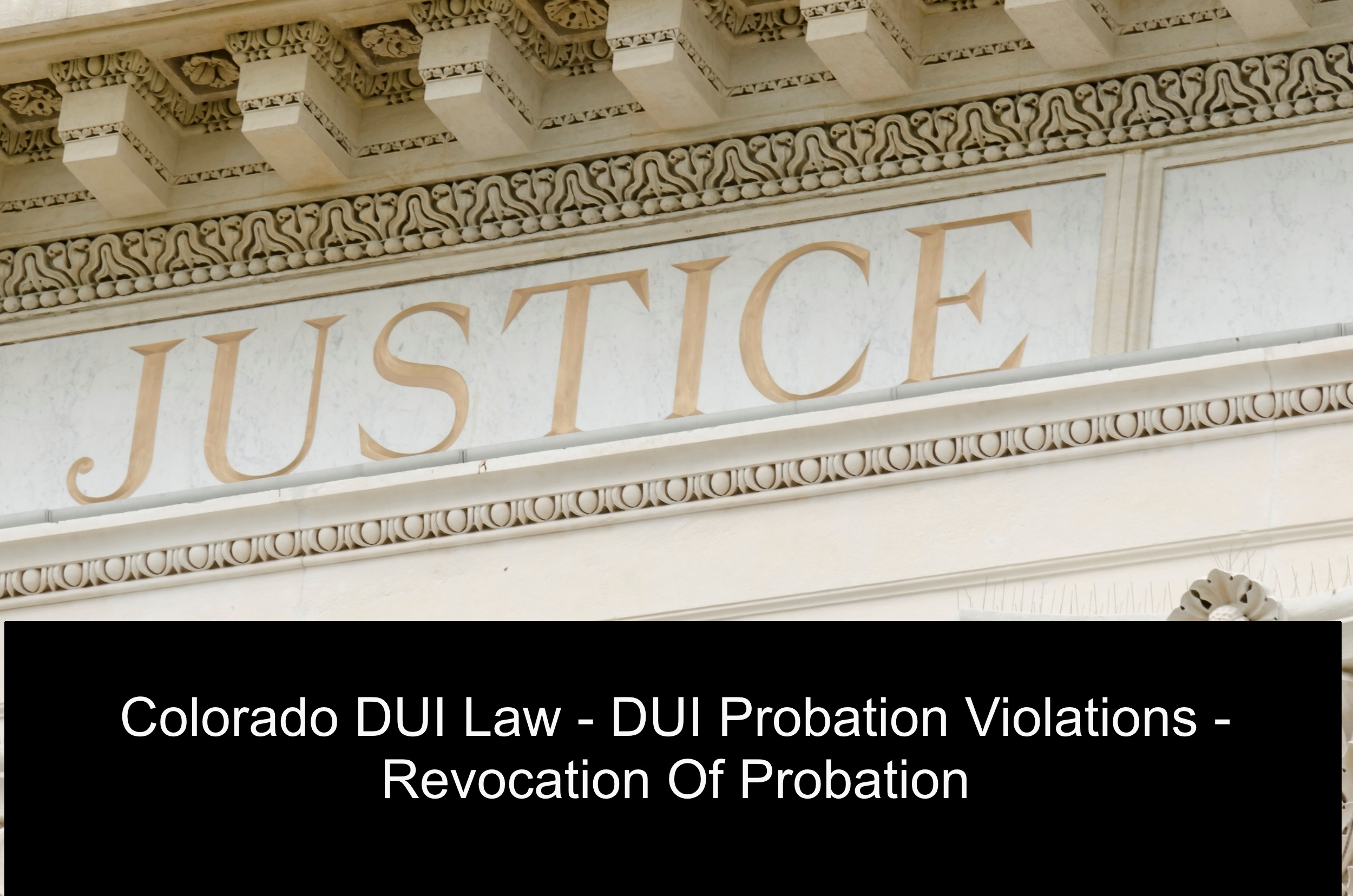
Other Articles of Interest:
- Violations of DUI – DWAI – Probation In Colorado
- Colorado DUI Probation Violations – Why Time Is Of The Essence
- After The DUI -DWAI – DUID – Colorado Alcohol Based Driving Convictions For Driving Under Revocation, Denial And Restraint 42-2-138
- Colorado’s Habitual Traffic Offender Law – CRS 42-2-206 – Driving After Revocation Prohibited – DAJP
- Proving Driving Under Revocation § 42-2-138 – In The State Of Colorado


